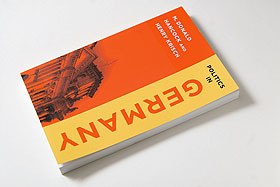  |
| HOME | THIS ISSUE | CALENDAR | GRANTS | BACK ISSUES | < BACK | NEXT > |
Political scientist's book examines evolution of modern Germanyby Karen Singer - April 6, 2009
|
||||
| Despite a turbulent 20th-century history, Germany has evolved into a country much like its neighbors, according to a new book about the metamorphosis. “We take this very definite stand that Germany has become a normal Western democracy … and now has the same problems, benefits, and lifestyles as the rest of the European community,” says Henry Krisch, professor emeritus of political science in the College of Liberal Arts and Sciences, who co-wrote the book, Politics in Germany (CQ Press, 2008). His co-author, M. Donald Hancock, is a political science professor at Vanderbilt University. The co-authors have known each other since the 1950s, when both were graduate students at Columbia University, where Krisch earned a master’s and Ph.D. and taught before joining the political science faculty at UConn in 1969. Krisch and Hancock wrote the book to fill a void in those currently available on the subject. “We thought we could add something to the accounts of German politics found in other studies, particularly by putting Germany’s current institutions and practices against the background of the existence of two German states for roughly a half century after World War II,” Krisch says. Their interests overlapped. West German politics is one of Hancock’s specialties and Krisch is an expert on East Germany, including the two decades since its collapse. The book examines “the effects of there having been an East Germany on election politics and cultural politics,” Krisch says. It also shows how modern Germany has reacted against the historical legacy of Nazism. “In some ways,” he adds, “there are fewer and fewer people who feel a sense of personal responsibility, because they weren’t alive during those years.” Krisch notes that the Nazi regime is still strong in the public consciousness, with a steady stream of factual and fictional accounts. The era has proved fruitful for filmmakers, among them increasingly a growing number of Germans.
Recent movies include Valkyrie with Tom Cruise, The Reader, starring Kate Winslet and nominated for five Oscars, and The Baader Meinhof Complex, a contender for this year’s Academy Award for best foreign film. (In Krisch’s book, Ulrike Meinhof, one of the co-leaders of a late-1960s terrorist group, is on a list of prominent women in modern German politics.) The new book analyzes political parties, election outcomes, social movements, socioeconomic politics, and pop culture in Germany, as well as the country’s relationships with Europe and the world. “One of the things that is interesting is the ways Germans are able now to engage in military action abroad, which would have been unthinkable 10 years ago,” Krisch says. “So in that sense, it has become more normal.” He cites other signs of normality. “There’s a conflict in Germany, which you have in other European countries and in the U.S., between those who want to preserve a safety net without too much inflation or too much debt and those who would like to have a freer market,” he says. “They have the same sort of issues about executive compensation and reining in markets that have gone unregulated, and the same sort of issues about integrating immigrant communities, the largest of which is Turkish. They’re questioning what it means to be a German citizen.” Debate about such real and controversial issues is likely to intensify, as Germans gear up for a federal election in September 2009. Krisch plans to be there, as a member of a group of academic observers. Since retiring in 1999, Krisch has remained in the Storrs area and retained close ties to UConn, where he is a member of the Gladstein Human Rights Committee. His current interests include the legal and human rights aspects of prohibiting Holocaust denial. |
| ADVANCE HOME UCONN HOME |

